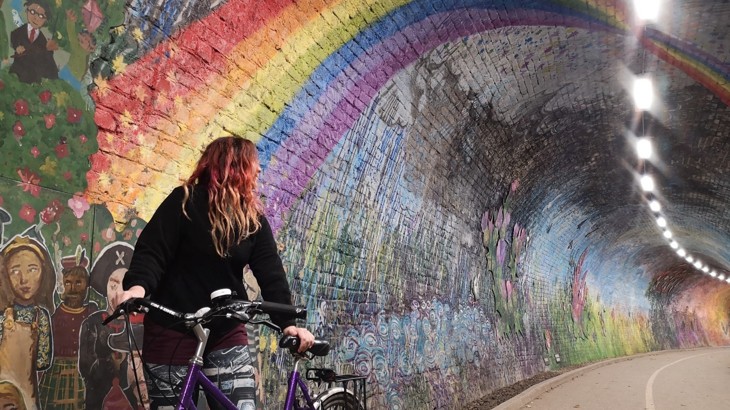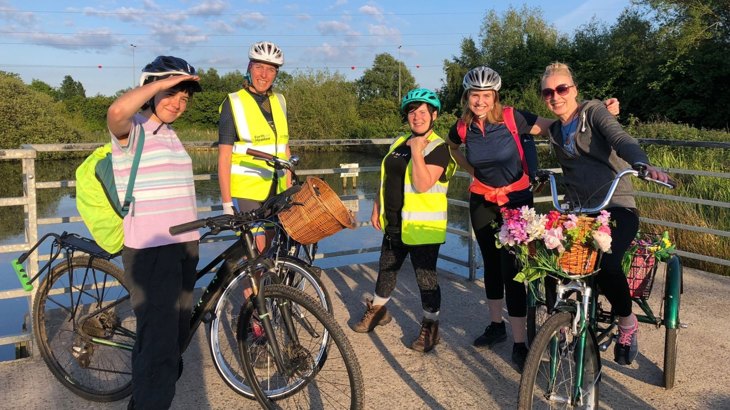Charlotte is our Volunteering Diversity and Inclusion Development Officer here at Sustrans and a member of the neurodiverse community. She discusses how Sustrans needs to embrace neurodiversity in and out of the workplace if we are to progress as a charity for everyone.

Colinton Tunnel in Edinburgh on National Cycle Network Route 75. Credit: Cosmo Blake
During Neurodiversity Celebration Week, the world comes together to recognise the diversity of minds.
In it, we celebrate the beauty of neurological differences, neurotypes and us, neurodistinct people.
On our own journey to becoming a charity for everyone, we at Sustrans must remember people like me, my fellow colleagues and volunteers who experience the world differently from the majority.
As an autistic person, it makes my heart sing to know that the neurodiversity movement is growing larger and more powerful every day.
For too long, we have been part of a marginalised community with little to say in a world that has solely focused on our deficits.
Many of us didn’t even know that we were part of this community until much later in our lives.
Now people are finally beginning to understand what having ADHD, Tourette’s, and dyscalculia or being autistic and dyslexic can look like.
Making Sustrans a charity for neurodiverse people
Even our neighbourhoods and lived environments directly disable us from living on equal terms.
Our recent research into the experiences of disabled people – including those of neurodiverse people – has identified what needs to change to make walking and wheeling better for everyone.
When it comes to the wider working world, a 2020 study by the Institute of Leadership & Management revealed that 50% of managers in industries across the UK said they would not hire neurodivergent candidates.
For many of us, getting a job in the first place is a challenge.
But we neurodivergent people are determined to smash the stereotypes.
We’re demanding to be, live and work as we are.
Now, we need real actions to make actual change happen.
Within Sustrans, I am working with others to make sure neurodivergent people are included and feel like they belong too.
Our Neurodiversity Network for colleagues
In late 2021, I had only been with Sustrans for a few months when I saw a post by a colleague on our internal forum.
She had publicly shared with everyone that she had been diagnosed with ADHD.
Sharing such a personal part of herself to all colleagues was incredibly brave and inspiring, so I reached out to her.
Along with two other colleagues, we arranged for a colleague learning session about neurodiversity in what was probably a first for Sustrans.
A colleague network quickly came thereafter as the organisation woke up to neurodiversity.
Since this event, we have continued to engage in awareness-raising throughout the year.
It has helped some colleagues to finally seek a diagnosis.
For others, it has even led to finding out that they are neurodivergent in the first place.
For now, the network is for neurodistinct colleagues to be together, a space to empower each other and share experiences, support and work-hacks.

Sustrans volunteers are helping create happier and healthier lives for everyone. Credit: Dayne Phillips
Empowerment through volunteering
We have thousands of incredible people volunteering and engaging with us around the UK.
I am fortunate to be part of the team that looks after these people and supports them to be engaged in their own community.
We know that there are systemic barriers which prevent some people from volunteering.
We are working actively to dismantle these to make volunteering inclusive and accessible.
This means having neurodiversity in mind too, and to remember that, statistically, about 500 people currently volunteering with us are also neurodivergent.
Volunteering has played an important part in my own life.
It’s what directly resulted in employment for me on not just one but several occasions in the past.
I did not have to go through interviews, as these have often been a barrier for me.
Instead, I’ve been offered work opportunities based on who I am and what people already knew I could do from my volunteering.
Volunteering can offer neurodivergent people opportunities in many areas of their life.
I am determined that our volunteering offer can play its part.
Our experiences as neurodivergent employees
About one in seven people (around 15%) are neurodivergent.
This means that over a hundred of my colleagues belong to the neurodiversity community, like me.
This is likely an underestimate.
Neurodistinct people are at every level of Sustrans.
From assistants and officers to managers, heads of departments and directors.
You will find us in every department and line of work.
We prove that neurodivergent people can work in any field and at any level within an organisation.
We just need equitable measures, opportunities and understanding to be and work at our best, like everyone else.
I have only been met with support and understanding from my line manager and team when I shared that I’m autistic.
I know other colleagues, including new to Sustrans, have felt the same.
When line managers understand their direct impact, and how their support and understanding can go a long way, then we are off to the right start.
This doesn’t mean that my colleagues and I don’t have negative experiences.
Amongst other things, how meetings are formatted, how training is delivered, and how we each communicate makes it harder for me and my fellow neurodiverse colleagues to be and work at our best.
They are ways of work that haven’t been created with us in mind, but we continue to challenge these existing ways of doing things.
For a neurodivergent person, or indeed anyone, to thrive in a workplace, we need to have person-centred approaches, an understanding that no person works the same, neurodivergent or not.
This is essential for today’s workplace to be inclusive.
Neurodiverse leadership
Neurodivergent people occupy all levels within Sustrans, including leadership positions.
Within the neurodiversity movement, we are still looking into how neurodivergent people get to the top.
A large proportion of employers fear even hiring neurodivergent people.
It can only follow then that our chances of getting into a leadership position are limited.
Do we get there through masking and not being our authentic selves?
And once we get there, how inclusive is it really of us and our needs?
For everyone, we need to place less focus on how things are done and focus more on the outcome.
Only then will we fully see the incredible contributions people provide in their own way.
This may also improve neurodivergent employees’ opportunities of getting into leadership roles, and not at the costs of their own health or wellbeing.
Now is the time for action
‘Including everyone’ and ‘always learning’ are two of our key values as an organisation.
Sustrans is learning. There is still some way to go before it will be a truly inclusive place, where all neurodiverse employees and volunteers can thrive and be themselves.
Anyone like me who works in diversity, equity, and inclusion knows that change unfortunately doesn’t happen overnight, nor will you see the results immediately.
I am hoping that as awareness and understanding increases, more inclusive work and volunteering practices will continue to be developed for everyone.
We need everything that the diversity of minds can bring to the table.
In our workplaces, when volunteering, during community engagement, in our street designs and across the neighbourhoods we reach.
You are part of the solution too.
Celebrate and embrace a neurodiverse society and accept people as they are.
Use the power you have to create the changes needed.
Not just on this Neurodiversity Celebration Week but all year round.
Discover what it's like to volunteer with Sustrans and find a volunteering opportunity near you.





